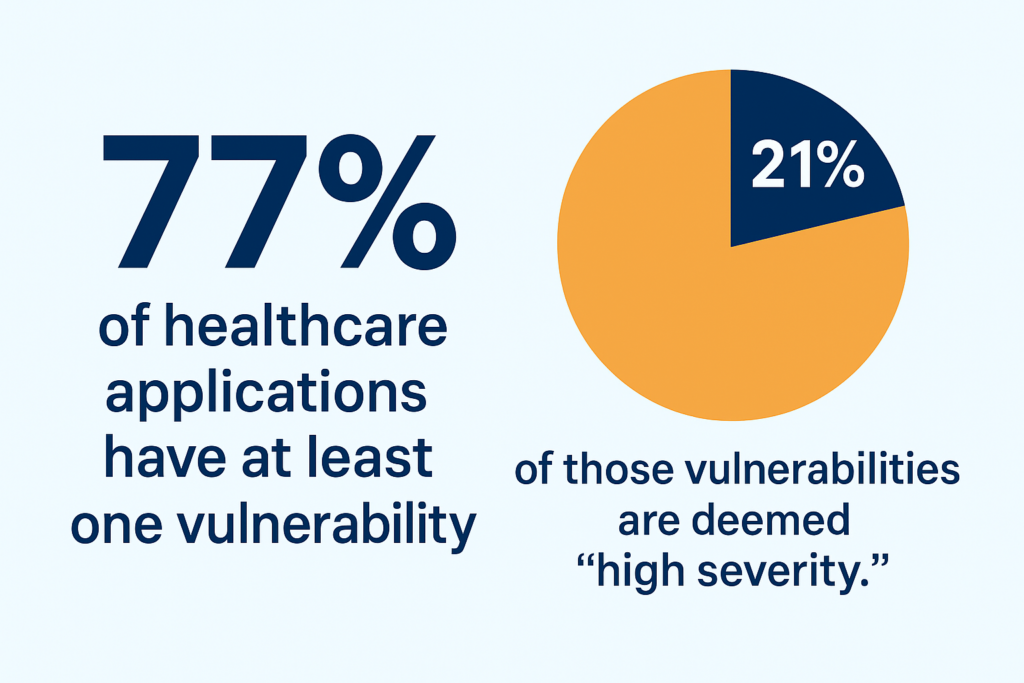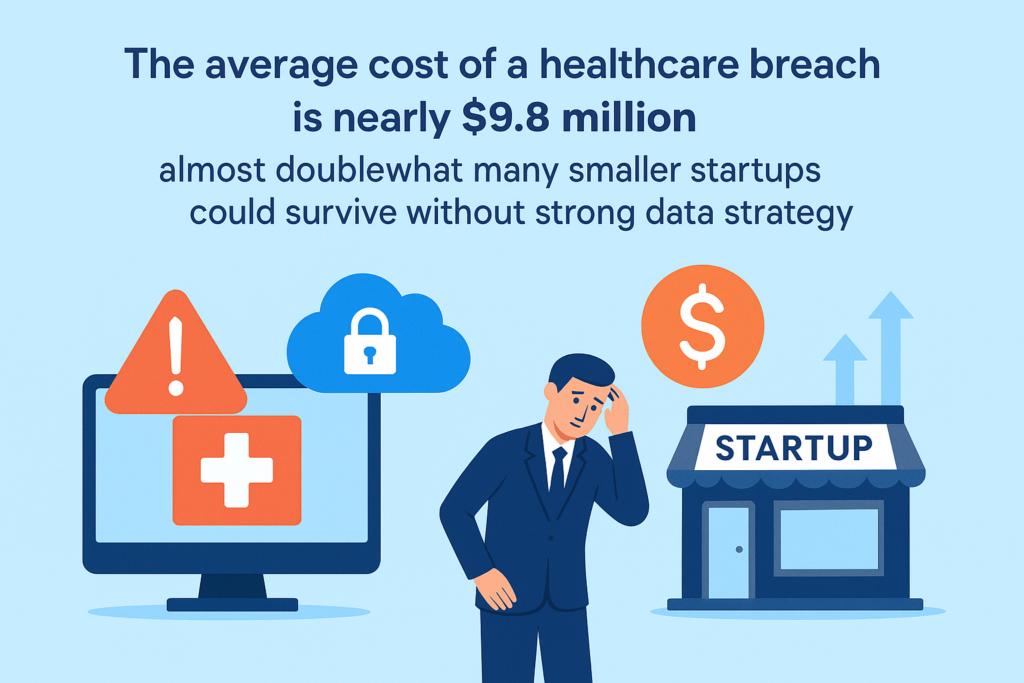How to Build for Quality, Trust, and Growth
Every healthcare data startup needs a strong foundation for long-term impact. In the fast-changing digital health ecosystem, health tech builders who focus on improving healthcare data from day one gain the power to innovate faster, deliver safer solutions, and earn user trust.
Many health tech startups have failed not because of a lack of innovation, but because they lacked a solid data strategy from the start. Without clear systems for data governance, compliance, and interoperability, they quickly ran into scalability and trust issues.
According to Veracode’s State of Software Security report, 77% of healthcare applications have at least one vulnerability, and **21% of those vulnerabilities are deemed “high severity.”
Without solid design around data security, compliance and risk management, many apps are exposed to threats from the start.
More broadly, healthcare data breaches are widespread: in 2024 there were 387 reported breaches in the U.S. affecting 500 or more records, a nearly 9.3% increase over the same period in 2023.
The average cost of a healthcare breach is nearly $9.8 million, almost double what many smaller startups could survive without strong data strategy


That’s why building a solid foundation for your startup’s data journey isn’t optional – it’s essential. Whether you’re developing a new digital health platform or scaling your existing solution, focusing on these key pillars from day one will help you grow faster, safer, and smarter.
Set the Table for Success
Define Mission and Business Drivers
At this stage, a startup should clearly define why it collects and uses data and what business value it aims to create. This alignment ensures that technical decisions support real product goals and user needs.
A clear mission anchors every healthcare data startup. Before collecting a single dataset, founders should identify the medical, operational, or behavioral problem they aim to solve – whether that’s reducing diagnostic errors, predicting health risks, or personalizing care journeys.
Once the problem is clear, link it to measurable outcomes – efficiency, clinical accuracy, user retention, or reduced costs. This connection justifies every data investment.
When business drivers are mapped, health tech builders can create a strategic roadmap defining what data to collect, how to process it, and which analytics to implement.
A focused plan around improving healthcare data helps transform numbers into real-world outcomes – laying the groundwork for data-driven healthcare innovation.
Lay the Bricks Right from the Start
Build the Right Platform Architecture and Tools
One of the most critical choices for startups is whether to build or buy a healthcare data platform.
Off-the-shelf healthcare data platforms can accelerate development, providing built-in compliance, interoperability, and clinical standards.
However, building in-house offers greater flexibility and control – ideal for niche or research-driven startups.
The key is modularity: data ingestion, cleaning, secure storage, and analytics layers should operate independently but seamlessly.
Modern healthcare data management tools – including ETL automation, FHIR-based APIs, and real-time data pipelines – help reduce friction and improve consistency.
This synergy unlocks scalable data pipelines for modern healthcare. It ensures critical clinical information flows reliably from point-of-care to analytics platforms. Ultimately, this turns disparate healthcare data into a ready-to-use asset for driving insights.
A smart architecture doesn’t just store data; it prepares it for insights, enabling teams to continuously refine and scale as the product grow.
Keep the House in Order
Ensure Governance
Governance is the foundation of improving healthcare data, ensuring that every record is accurate, compliant, and trustworthy. For any healthcare data startup, clear governance defines who owns, accesses, and manages data across systems.
Without it, even the most advanced health tech solution risks inconsistency, duplication, and compliance failures. Strong governance enables health tech startups to build credibility and maintain regulatory alignment from day one. Modern healthcare data platforms rely on structured policies that support transparency and accountability at every level.
By integrating healthcare data management tools, teams can automate auditing, version control, and access monitoring. This creates a secure, scalable environment for data-driven healthcare, where insights are both reliable and actionable. Forward-thinking health tech builders know that governance isn’t bureaucracy – it’s the engine of sustainable innovation.
Foundation Data Strategy for Healthcare

Make it Shine
Ensure Quality
High-quality data is the core of improving healthcare data and drives accurate, meaningful insights in modern care systems. For a healthcare data startup, ensuring data quality means verifying accuracy, completeness, and consistency across every source.
Health tech startups use automated validation checks and real-time monitoring within their healthcare data platforms to detect and fix errors early. Integrating advanced healthcare data management tools helps eliminate duplicates, standardize formats, and maintain continuous reliability.
In a data-driven healthcare ecosystem, clean and trusted data empowers clinicians, researchers, and patients alike.
Forward-looking health tech builders know that maintaining data quality is not a one-time task – it’s a continuous commitment to excellence.
Don’t Leave the Doors Open
Ensure Data Security
Data security is the backbone of improving healthcare data, protecting sensitive information from breaches and misuse. For every healthcare data startup, ensuring strong security means building trust with patients, partners, and regulators from the start.
Using robust healthcare data management tools, health tech builders can monitor data access, detect anomalies, and enforce compliance automatically.
In a world of data-driven healthcare, maintaining privacy is as critical as generating insights.
Security frameworks aligned with HIPAA, GDPR, and other healthcare regulations help health tech startups avoid costly violations.
Data transparency – knowing who accessed what and when – strengthens accountability and prevents misuse.
By embedding security into every layer of infrastructure, organizations ensure safe innovation and long-term patient trust.
Ultimately, protecting healthcare data isn’t just a technical requirement – it’s a moral obligation for every responsible innovator.
Coffee’s Last Sip – Conclusion
A great data strategy doesn’t start with technology – it starts with purpose.
In practice, initiatives such as data-focused workshops and Proof-of-Concept projects have proven effective in aligning data capabilities with real healthcare needs.
At Amazinum, this approach enables data-driven transformation and informed decision-making across complex healthcare ecosystems.
Key takeaways:
- Strategic alignment: Ensures that data initiatives address genuine clinical and operational challenges.
- Risk mitigation: Validates data quality, usability, and feasibility before large-scale implementation.
- Collaboration model: Strengthens communication between data teams and healthcare professionals.
- Scalable innovation: Builds a foundation for sustainable growth and measurable outcomes.
More on the intersection of data strategy, AI, and healthcare innovation is available via Amazinum.




